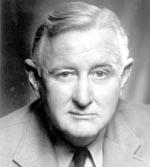 The two best-known students of the late C. Vann Woodward (right) are now officially at odds.
The two best-known students of the late C. Vann Woodward (right) are now officially at odds.A review in the Washington Post makes clear Edward L. Ayers' new book, What Caused the Civil War, self consciously tries to resurrect the thesis of J.G. Randall (Lincoln) that "the Civil War was not the result of conflict over such fundamental issues as slavery but rooted in the fury born of overwrought party politics and an irresponsible, partisan press."
Woodward's other student, James McPherson, has spent his life combatting Randall's ideas.
[Ayers'] essays take on what Ayers sees as the new consensus view of the war, exemplified in the grand narrative history of James McPherson's Battle Cry of Freedom and Ken Burns' nine-part PBS documentary film on the war. According to the McPherson-Burns thesis, the Civil War was the inevitable consequence of slavery, fought nobly on both sides and a necessary, if bloody, crucible in which the American nation became "greater through suffering."We are seeing the Civil War consensus strained at every level.
***
Update, 4:15 p.m. Brooks Simpson was good enough to point out to me some "family matters" associated with the split in the house of Woodward. My summary of his observations:
* Ayers' book, opposing McPherson's interpretation of the causes of the war, was brought out by the publisher Norton. Norton is run by the son of Grant author William McFeely; McFeely and McPherson have not previously been friendly.
* Some of Ayers' arguments have previously been voiced by colleague Michel F. Holt. "Holt knew Woodward, but worked under David Donald, who was the student of ... you guessed it ... James G. Randall." [Ayers has taken up Randall's interpretation of origins to overturn McPhersons'.]
* Simpson writes, "Blight [Ayers'reviewer] and I went to school together, and I went to UVa and [...] worked with Holt; when my undergrad adviser (another Donald
student) failed to win tenure, he was replaced - by Ed Ayers. Small world."
Interesting world, too.



